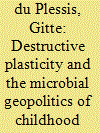|
|
|
Sort Order |
|
|
|
Items / Page
|
|
|
|
|
|
|
| Srl | Item |
| 1 |
ID:
158668


|
|
|
|
|
| Summary/Abstract |
As students and scholars of global politics, we have been witnessing, participating in, and feeling the effects of recent global upheavals. These include specific events, such as the election of Trump and the vote for Brexit, but are better understood through their resulting political effects (e.g., pushing back on migration, hardening national borders, denying climate change, reneging on trade deals, gutting the welfare state, increasing resource extraction, and curtailing rights). Commentators refer to these upheavals in different ways: a rise in populism, reinvigorated nationalism, the new fascism, a polarization of Right and Left, the end of globalization, and posttruth politics. These labels have not only generated a great deal of scholarly debate, they have also helped generate multiple energies, including activism, protest, and politicization. Such developments feel at once totally unprecedented but also eerily familiar. More to the point, they have very different manifestations in different parts of the world; indeed, one of the difficulties of the present moment is the lack of analysis about the global ramifications of these upheavals.
|
|
|
|
|
|
|
|
|
|
|
|
|
|
|
|
| 2 |
ID:
193310


|
|
|
|
|
| Summary/Abstract |
Engaging Catherine Malabou's philosophical work on biological plasticity, this article combines microbiological and geopolitical analysis of the deadliest manifestations of childhood malnutrition. At the scale of microbiology, childhood malnutrition is a devastating condition and a mystery to which it seems microbiomes – the ecosystems of microbes in the gut – hold a key. At the scale of geopolitics, childhood malnutrition is a calamity generated by racial capitalism, poverty, and underdevelopment. What should we do with the plasticity that makes us? Malabou asks. Engaging philosophically with the plastic materiality of microbiomes in childhood malnutrition, the article focuses on destructive plasticity as an ontological alternative to what science on malnutrition pursues as a problem of causality. This leads to an argument that medicine, as well as humanitarian, security, and development interventions, must reckon with the destructive plasticity of what is in essence a political disease of annihilation. The article ends by speculating on resistance via the biological act of nurturing.
|
|
|
|
|
|
|
|
|
|
|
|
|
|
|
|
|
|
|
|
|